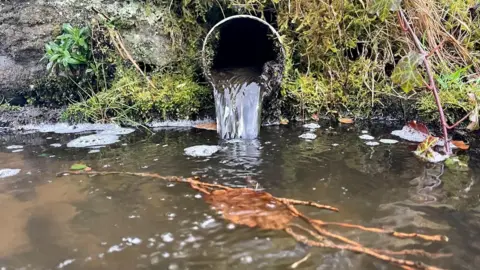Welsh Water bills may rise £120 by 2030 to tackle pollution
 Getty Images
Getty ImagesWater bills in Wales could go up by £120 a year by 2030 as Welsh Water pledges to cut river pollution.
The firm said its new business plan would see bills rise by £5 more a month in 2025 and £10 a month more by 2030.
It said it had submitted its 2025-30 blueprint to industry regulator Ofwat for approval.
Campaigners said the water industry model was "broken", where firms fail to take a long-term approach but pay senior executives large bonuses.
Welsh Water chief executive Peter Perry called the plan the company's most ambitious yet.
He said: "We now need to make a material investment in our water and wastewater systems to meet the challenges of climate change, protect our rivers, and improve the resilience of our water supplies."
The challenge was "significant", but Mr Perry was confident it could be met.

Alastair Lyons, chairman of Welsh Water owner Glas Cymru, said: "Our £3.5bn investment programme will also bring significant opportunities to increase our contribution to the Welsh economy."
By 2030 the company also wants to:
- Improve tap water and cut complaints about it by 57%
- Cut leaks across its network by a quarter
- Slash pollution incidents by 24%
- Replacing the lead pipes of 7,500 customers
- Reduce running costs by £42m
- Use £13m a year from 2025 to 2030 to maintain and expand schemes to help the poorest customers
One of the founders of the Welsh Rivers Union, Kim Waters, told BBC Radio Wales Breakfast: "We've seen our rivers deteriorate, largely due to sewage but other factors as well like agriculture."
He said there were "no guarantees" in the proposals: "The very fact that we are looking to a future where there's just a five-year plan - one thing I can guarantee everybody is in 100 years time we will still be worrying about clean water and sewage."
He added: "We are in a unique situation in Wales in that Dwr Cymru (Welsh Water) is a private company but a not-for-profit."
He welcomed that some action was being taken, but called for a more comprehensive approach beyond five years and better regulation from Natural Resources Wales to ensure the company was properly monitored.
Welsh Conservative Shadow Climate Change Minister Janet Finch-Saunders said the proposed rise was "completely unacceptable".
"Along with this, the CEO's salary is a whopping £332,000 (not including pension contributions and bonus payments). This will understandably frustrate and anger hard-working customers.
"As we regretfully know, nearly a quarter of all sewage discharges in the whole of England and Wales are in Wales, with Welsh rivers making up six of the top 20 rivers in England and Wales for the overall highest number of sewage dumps. Labour have let people down on sewage in Wales repeatedly."
Plaid Cymru energy spokesperson Delyth Jewell said: "People in Wales are already facing rising costs and inflicting higher bills on them during a cost of living crisis is unacceptable - in this instance, the polluter should pay to clean up our water.
"The Welsh government is hamstrung by its own inaction in requesting the transfer of power over water.
"The current devolved framework in Wales falls well short of where it needs to be and further devolution of powers is needed to enable the government to effectively address the problem of sewage discharges into Wales' rivers and seas."
What is Welsh Water planning?
In February it was announced customers would face paying out £14 more a year for their water.
That would bring the average bill to £499 a year - the second highest in Wales and England.
The company said its research had shown 84% of customers found the new plan "acceptable".
In recognition of the cost of living crisis it said it would boost support for customers struggling to make ends meet with funds it has because of its not-for-profit status.
The plan, the firm said, had been shaped by customers and the Welsh government's price review guidelines.
"It prioritises improving river water quality and addressing the challenge of storm overflows, enhancing key services, and strengthening resilience against the challenges facing the company, in particular climate change," a spokesman said.
If approved it said it would be the company's biggest investment programme, worth £3.5bn investment over the five years.
That, said Welsh Water, would be equivalent to a 68% increase on investment between 2020 and 2025.
It said it was committing to invest almost £1.9bn to environmental improvement between 2025 and 2030.
"This will include substantially reducing phosphorous discharges from wastewater treatment to rivers in special areas of conservation," a spokesman said.
A programme to stop its 2,300 storm overflows polluting rivers will also be put in place.
The business said the programme reaffirmed its intention to become carbon neutral by 2040.
